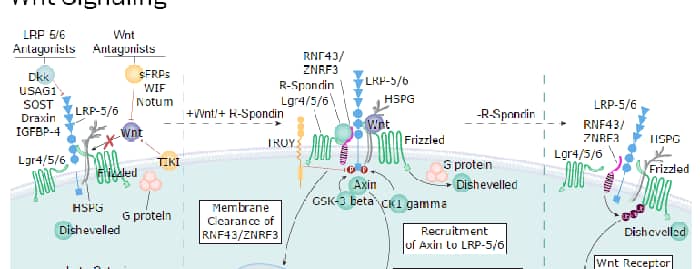Wnt-4 is a 38‑42 kDa member of the Wnt family of secreted glycoproteins, which act as short-range signaling molecules via Frizzled receptors and a cascade of intracellular signals in vertebrate embryogenesis (1‑2). Mouse Wnt-4 is synthesized as a 351 amino acid (aa) precursor with a 22 aa signal sequence and a 329 aa mature chain. The mature chain contains two potential sites for N-linked glycosylation. Relative to other members of the Wnt family, Wnt-4 contains 83 conserved aa, including 21 cysteines (1). Mature mouse Wnt-4 shares 99% aa sequence identity with mature human and rat Wnt-4. Wnt-4 has been shown to play a critical role in the development of the reproductive system and in the formation of the kidneys, adrenals, pituitary gland, and mammary tissues (3‑6). In the development of the reproductive system, Wnt-4 expression is down-regulated in the developing gonad after E11.5, although it persists in the developing ovary (2, 6). Targeted deletion of Wnt-4 results in masculinization of XX mice, with rudimentary development of the masculine internal (Wolffian) ducts and degeneration of the female (Mullerian) reproductive tract (2, 6). In addition to its involvement in urogenital development, Wnt-4 is also expressed in the perichondrium of the long bones (7), and promotes osteoblast differentiation (8). Wnt-4 may also be associated with abnormal proliferation in human breast tissue (9). In humans, mutations in Wnt-4 are the cause of SERKAL syndrome, a syndrome consisting of female to male sex reversal, renal, adrenal, and lung dysgenesis, and developmental defects (3), and Rokitansky-Kuster-Hauser syndrome, which is characterized by utero-vaginal atresia in otherwise phenotypically normal females with normal 46, XX karyotype (10).


Key Product Details
Species Reactivity
Validated:
Mouse
Cited:
Human, Mouse, Rat, Transgenic Mouse
Applications
Validated:
Immunohistochemistry, Western Blot
Cited:
Immunohistochemistry, Immunohistochemistry-Paraffin, Western Blot, Neutralization, Immunoprecipitation
Label
Unconjugated
Antibody Source
Polyclonal Goat IgG
Loading...
Product Specifications
Immunogen
E. coli-derived recombinant mouse Wnt-4
Ile37-Glu76, Arg222-Thr295
Accession # P22724
Ile37-Glu76, Arg222-Thr295
Accession # P22724
Specificity
Detects mouse Wnt-4 in direct ELISAs and Western blots. The antibody has also been shown to recognize a mammalian cell-expressed mouse Wnt-4 protein in Western blots.
Clonality
Polyclonal
Host
Goat
Isotype
IgG
Scientific Data Images for Mouse Wnt‑4 Antibody
Detection of Wnt-4 by Flow Cytometry
Wnt4 enhances LSK expansion in culture via JNK-dependent mechanisms.A) Fetal liver cells cultured on NIH3T3 or NIH3T3-Wnt4 cells for 24–72 h&the proportion&number of LSKs analyzed by flow cytometry at different time points. Histograms on the left show absolute numbers of LSKs&the %age of LSKs expressing high levels of Flt3 (mean ± SEM; n = 7). Representative flow cytometry data for both Wnt4 (▪)&control (□) cultures after 48 h are shown on the right. Numbers in the upper-right corners of the FACS panels represent the %age of LSKs over total live events. *P≤0.05, **P≤0.005, Wnt4 vs control (paired). Image collected & cropped by CiteAb from the following open publication (https://pubmed.ncbi.nlm.nih.gov/21541287), licensed under a CC-BY license. Not internally tested by R&D Systems.Applications for Mouse Wnt‑4 Antibody
Application
Recommended Usage
Immunohistochemistry
5-15 µg/mL
Sample: Immersion fixed paraffin-embedded sections of rat embryo (E15)
Sample: Immersion fixed paraffin-embedded sections of rat embryo (E15)
Western Blot
0.1 µg/mL
Sample: Recombinant Mouse Wnt‑4
Sample: Recombinant Mouse Wnt‑4
Reviewed Applications
Read 1 review rated 4 using AF475 in the following applications:
Formulation, Preparation, and Storage
Purification
Antigen Affinity-purified
Reconstitution
Reconstitute at 0.2 mg/mL in sterile PBS. For liquid material, refer to CoA for concentration.
Loading...
Formulation
Lyophilized from a 0.2 μm filtered solution in PBS with Trehalose. *Small pack size (SP) is supplied either lyophilized or as a 0.2 µm filtered solution in PBS.
Shipping
Lyophilized product is shipped at ambient temperature. Liquid small pack size (-SP) is shipped with polar packs. Upon receipt, store immediately at the temperature recommended below.
Stability & Storage
Use a manual defrost freezer and avoid repeated freeze-thaw cycles.
- 12 months from date of receipt, -20 to -70 °C as supplied.
- 1 month, 2 to 8 °C under sterile conditions after reconstitution.
- 6 months, -20 to -70 °C under sterile conditions after reconstitution.
Calculators
Background: Wnt-4
References
- Gavin, B.J. et al. (1990) Genes Dev. 4:2319.
- Jordan, B.K. et al. (2001) Am. J. Hum. Genet. 68:1102.
- Mandel, H. et al. (2008) Am. J. Hum. Genet. 82:39.
- Bernard, P. and V.R. Harley (2007) Int. J. Biochem. Cell Biol. 39:31.
- Kuulasmaa, T. et al. (2008) Horm. Metab. Res. 40:668.
- Vainio, S. et al. (1999) Nature 397:405.
- Gao, X. (2004) Genes Dev. 18:2404.
- Chang, J. et al. (2007) J. Biol. Chem. 282:30938.
- Huguet, E.L. et al. (1994) Cancer Res. 54:2615.
- Philibert, P. et al. (2008) J. Clin. Endocrinol. Metab. 93:895.
Long Name
Wingless-type MMTV Integration Site Family, Member 4
Alternate Names
Wnt4
Gene Symbol
WNT4
UniProt
Additional Wnt-4 Products
Product Documents for Mouse Wnt‑4 Antibody
Certificate of Analysis
To download a Certificate of Analysis, please enter a lot or batch number in the search box below.
Note: Certificate of Analysis not available for kit components.
Product Specific Notices for Mouse Wnt‑4 Antibody
For research use only
Related Research Areas
Citations for Mouse Wnt‑4 Antibody
Customer Reviews for Mouse Wnt‑4 Antibody (1)
4 out of 5
1 Customer Rating
Have you used Mouse Wnt‑4 Antibody?
Submit a review and receive an Amazon gift card!
$25/€18/£15/$25CAN/¥2500 Yen for a review with an image
$10/€7/£6/$10CAN/¥1110 Yen for a review without an image
Submit a review
Showing
1
-
1 of
1 review
Showing All
Filter By:
-
Application: Immunohistochemistry-ParaffinSample Tested: See PMID 22445810Species: MouseVerified Customer | Posted 01/08/2015
There are no reviews that match your criteria.
Protocols
Find general support by application which include: protocols, troubleshooting, illustrated assays, videos and webinars.
- Antigen Retrieval Protocol (PIER)
- Antigen Retrieval for Frozen Sections Protocol
- Appropriate Fixation of IHC/ICC Samples
- Cellular Response to Hypoxia Protocols
- Chromogenic IHC Staining of Formalin-Fixed Paraffin-Embedded (FFPE) Tissue Protocol
- Chromogenic Immunohistochemistry Staining of Frozen Tissue
- Detection & Visualization of Antibody Binding
- Fluorescent IHC Staining of Frozen Tissue Protocol
- Graphic Protocol for Heat-induced Epitope Retrieval
- Graphic Protocol for the Preparation and Fluorescent IHC Staining of Frozen Tissue Sections
- Graphic Protocol for the Preparation and Fluorescent IHC Staining of Paraffin-embedded Tissue Sections
- Graphic Protocol for the Preparation of Gelatin-coated Slides for Histological Tissue Sections
- IHC Sample Preparation (Frozen sections vs Paraffin)
- Immunofluorescent IHC Staining of Formalin-Fixed Paraffin-Embedded (FFPE) Tissue Protocol
- Immunohistochemistry (IHC) and Immunocytochemistry (ICC) Protocols
- Immunohistochemistry Frozen Troubleshooting
- Immunohistochemistry Paraffin Troubleshooting
- Preparing Samples for IHC/ICC Experiments
- Preventing Non-Specific Staining (Non-Specific Binding)
- Primary Antibody Selection & Optimization
- Protocol for Heat-Induced Epitope Retrieval (HIER)
- Protocol for Making a 4% Formaldehyde Solution in PBS
- Protocol for VisUCyte™ HRP Polymer Detection Reagent
- Protocol for the Preparation & Fixation of Cells on Coverslips
- Protocol for the Preparation and Chromogenic IHC Staining of Frozen Tissue Sections
- Protocol for the Preparation and Chromogenic IHC Staining of Frozen Tissue Sections - Graphic
- Protocol for the Preparation and Chromogenic IHC Staining of Paraffin-embedded Tissue Sections
- Protocol for the Preparation and Chromogenic IHC Staining of Paraffin-embedded Tissue Sections - Graphic
- Protocol for the Preparation and Fluorescent IHC Staining of Frozen Tissue Sections
- Protocol for the Preparation and Fluorescent IHC Staining of Paraffin-embedded Tissue Sections
- Protocol for the Preparation of Gelatin-coated Slides for Histological Tissue Sections
- R&D Systems Quality Control Western Blot Protocol
- TUNEL and Active Caspase-3 Detection by IHC/ICC Protocol
- The Importance of IHC/ICC Controls
- Troubleshooting Guide: Immunohistochemistry
- Troubleshooting Guide: Western Blot Figures
- Western Blot Conditions
- Western Blot Protocol
- Western Blot Protocol for Cell Lysates
- Western Blot Troubleshooting
- Western Blot Troubleshooting Guide
- View all Protocols, Troubleshooting, Illustrated assays and Webinars



